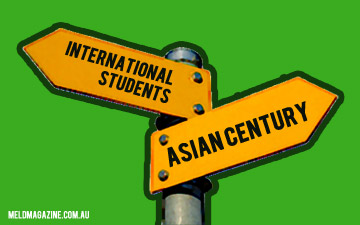Australian international students in the Asian Century
THE founder of the Australian Federation of International Students casts a critical eye on the government’s policy paper, Australia in the Asian Century. Wesa Chau says instead of viewing international students as “cash cows”, Australia needs to recognise the key role they will play in forging closer ties with Asia.

Australia in the Asian Century – international students could be the bridge to forging closer ties with Asia.
Last year, the Australian government released the much-publicised Australia in the Asian Century White Paper. The document primarily discusses Australia and how Australians can take advantage of their country’s proximity to Asia as well as the benefits of it being a western nation. But how does this all relate to international students in Australia?
Well, the White Paper seems to present international students as cash cows by highlighting their role of bringing money into the economy, which is positive for Australia. Yet there is little talk about how to strengthen the sector by supporting students (as customers) and how to improve the experiences of these customers to help facilitate better human relationships between Australian and international students.
Businesses in Australia will need to work harder to understand cultures in Asia, how business is done there and they’ll have to take advantage of the knowledge of international students.
International students bring enormous benefits to Australia. not just because they pay fees and keep half of the universities books balanced, but they also provide a person-to-person link for local university students for future international trade. They are also crucial cultural bridges who will enable successful business relationships in Asia.
As the White Paper points out quite correctly, business in Asia is not only about products, but relationships between people. Australia is competing with the rest of the world on this front, and although its location gives it an advantage over the US, UK and Canada, that’s not enough. Businesses in Australia will need to work harder to understand cultures in Asia, how business is done there and they’ll have to take advantage of the knowledge of international students.
Apart from the business advantages they provide, international students will become future ambassadors of Australia and can help aid soft diplomacy. One cannot, however, assume all ambassadors will be good ambassadors – that depends entirely on their experiences here in Australia. There is a saying in Chinese: “Embarrassing news spreads thousands of miles”. And we’ve seen this happen after the spate of violent attacks against Indian students in Australian in 2009.
Therefore, ensuring international students enjoy their study experience here is just as important as ensuring the maintenance of high academic standards.
What this all comes down to is, what can international students (Asian or not) do to take advantage of the Asian century and create opportunities for themselves? Despite the lack of understanding about how Australia should engage with Asia by government and businesses, I think strengthened ties with Asia will happen regardless.International students can prepare themselves in number of ways:
|
Wesa Chau is the director of Cultural Intelligence and the founder of the Australian Federation of International Students.
Do you agree with Wesa? Does Australia need to do more to recognise the important role international students will play in forging ties with Asia?
